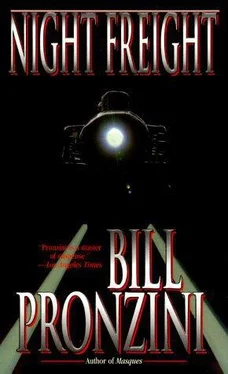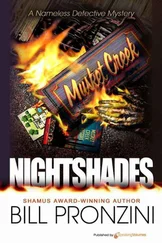Bill Pronzini - Night Freight
Здесь есть возможность читать онлайн «Bill Pronzini - Night Freight» весь текст электронной книги совершенно бесплатно (целиком полную версию без сокращений). В некоторых случаях можно слушать аудио, скачать через торрент в формате fb2 и присутствует краткое содержание. Год выпуска: 2000, ISBN: 2000, Издательство: Leisure Books, Жанр: Ужасы и Мистика, на английском языке. Описание произведения, (предисловие) а так же отзывы посетителей доступны на портале библиотеки ЛибКат.
- Название:Night Freight
- Автор:
- Издательство:Leisure Books
- Жанр:
- Год:2000
- ISBN:0843947063 (isbn13: 9780843947069)
- Рейтинг книги:5 / 5. Голосов: 1
-
Избранное:Добавить в избранное
- Отзывы:
-
Ваша оценка:
- 100
- 1
- 2
- 3
- 4
- 5
Night Freight: краткое содержание, описание и аннотация
Предлагаем к чтению аннотацию, описание, краткое содержание или предисловие (зависит от того, что написал сам автор книги «Night Freight»). Если вы не нашли необходимую информацию о книге — напишите в комментариях, мы постараемся отыскать её.
Night Freight — читать онлайн бесплатно полную книгу (весь текст) целиком
Ниже представлен текст книги, разбитый по страницам. Система сохранения места последней прочитанной страницы, позволяет с удобством читать онлайн бесплатно книгу «Night Freight», без необходимости каждый раз заново искать на чём Вы остановились. Поставьте закладку, и сможете в любой момент перейти на страницу, на которой закончили чтение.
Интервал:
Закладка:
"Yes, it does."
He handed over the thick stack, being cautious about it because he knew of her arthritis. "You going out today, Miz Halliday?"
"I may, yes. Why do you ask?"
"Well, it's pretty cold out. Wind's got ice in it, first breath of winter. Real pneumonia weather. Better bundle up warm if you do go out."
"I will, thank you."
He wished her a good morning and left her alone again.
Miranda sifted through her mail. No personal letters, of course. Just two bills and three solicitations, one of the solicitations addressed to "Maranda Holiday." She laid the bills, unopened, on the kitchen table, put the solicitations in the trash and the catalogues in the recycle box.
Except for the wind, the house was very quiet.
And still unwarm.
And so empty.
In her sewing room, she removed the letter—three pages, carefully folded—from the bottom drawer of her desk. She had written it quite a long time ago, but she could have quoted it verbatim. The wind gusted noisily as she started out with it, rattling shingles and shutters, and she remembered what Dwayne had said about bundling up warm. The front hall closet yielded her heaviest wool coat and a pair of fleece-lined gloves. She had the coat over her shoulders, the letter tucked into one of the pockets, when the phone rang again.
"Mrs. Halliday? This is Sally Boyer?"
"Yes, Mrs. Boyer."
"I wonder if I could ask a big favor? I know it's short notice and I haven't been in touch in a while, but if you could help us out I'd really appreciate it?" Mrs. Boyer was one of those individuals who turn statements into questions by a rising interrogative inflection on the last few words of a sentence. More than once Miranda had been tempted to help her correct this irritating habit, but it would have been impolite to bring it up herself.
"What is the favor?"
"Could you babysit for us tonight? My husband has a business dinner, a client and his wife from Los Angeles who showed up without any advance warning? Well, he thinks it's important for me to join them and our regular sitter has band practice tonight and so I thought you. . . ?"
"I'm afraid I have another commitment," Miranda said firmly.
"You do? You couldn't possibly break it?"
"I don't see how I can, now."
"But I thought you, of all people. . . I mean. . ."
"Yes, Mrs. Boyer, I understand. And I'm sorry."
"I don't know who else to call," Mrs. Boyer said. "Can you think of anyone? You must know someone, some other elder . . . some other person?"
"I don't know anyone," Miranda said. "No one at all."
She said goodbye and replaced the receiver. She buttoned her coat, worked her gnarled fingers into the gloves, then crossed the rear porch and stepped outside.
The wind was blustery and very cold, but she didn't hurry. It would not do to hurry at a time like this. She walked at a steady, measured pace across the leaf-strewn yard to the barn.
The front half was mostly a dusty catchall storage area, as it had been when John was alive. On the right side was a cleared section just large enough for her car; the remaining floor space was packed with trunks, boxes, discarded appliances, gardening equipment, and the like. Some of the cartons had been there for so long Miranda no longer had any idea what they contained. She made her way along the passenger side of the car to the doorway in the center partition; opened it and passed through into John's workshop.
His last few woodworking projects, finished and unfinished, were bulky mounds under the dustcloths she had placed over them. His workbench, lathe, table saws, and such were also shrouded. The bench was where the coiled rope lay, but Miranda did not go in that direction. Nor did she glance up at the ceiling beam in the shadows above.
At the workshop's far end, more shadows crowded the alcove where John had kept his cot and tiny refrigerator. On those long ago summer nights when he had been deep into one of his projects, he had slept out here to avoid disturbing her. Now there was nothing inside the alcove, only the bare wood floor over packed earth.
Miranda knelt and raised the cunningly hidden hinged section. Underneath, the flowers she had placed there last week were already withered and crumbling, dust and petals scattered across the pair of old graves.
So many years since she'd found John and Moira together here that night. So many years since the strangest whim had seized her and she'd done what she felt she must—shot them both with one of John's handguns, quickly and efficiently, for no one should have to suffer when the time came. So many years since she had, in her supremely capable fashion, dug for each of them a final resting place and then, using the woodworking skills John had taught her, rebuilt the flooring to cover the graves.
No one had ever suspected. John Halliday had run off with his wife's beautiful younger sister—that was what everyone believed. Such a terrible tragedy for poor Miranda, they all said. But no one except her could know how terrible it really was to be left all alone with nobody to love except a little dog and fewer and fewer ways in which to atone for her sin.
It would be quite a shock when the citizens of Shady Grove learned the truth. And learn it they must; she had kept the secret too long and she could not carry it with her to her own grave—in the words of the poet Andrew Marvell, that "fine and private place." She had explained everything in the three-page letter; it would be her final act of atonement.
John and Moira knew all about the rope and the letter. Over and over she had told them that one day she must again do what she felt was necessary. Yet they were so reluctant to let her go. She could feel their reluctance now. Selfish. Even in death, they cared only for themselves.
"John," she said, "this is the proper day. Can't you understand how I feel?"
The wind mourned outside.
"Moira? We've hurt each other enough. Isn't it time we were together again?"
The last of the flowers suddenly trembled and broke apart. The earth seemed to tremble, too, as if there were stirrings within. It was only a draft caused by the wind, she knew it could be nothing else, yet it was as if they had caused it. As if they were beseeching and mocking her, saying quite clearly: "You can't leave us, Miranda. Who will tend to us once you're gone? Who will bring flowers and keep the weeds from growing up around us?
" We need you, Miranda. You know that, don't you?"
She did not argue; it never did any good to argue. She sighed and got slowly to her feet. "After all," she said, "I think I will not hang myself today."
She lowered the hinged section, thinking that she must buy fresh flowers to replace the withered ones because it was autumn and there were none left in the garden. But before she called the florist, she would ring up Mrs. Boyer and tell her she would be able to babysit tonight after all.
"Stacked Deck." Copyright © 1987 by Bill Pronzini. First published in The New Black Mask #8 .
"Angel of Mercy." Copyright © 1996 by Bill Pronzini. First published in Diagnosis: Terminal .
"Night Freight." Copyright © 1967 by Renown Publications, Inc. Revised version copyright © 1991 by Bill Pronzini. First published in Mike Shayne Mystery Magazine .
"Liar's Dice." Copyright © 1992 by Bill Pronzini. First published in Ellery Queen's Mystery Magazine .
"Out Behind the Shed." Copyright © 1991 by Bill Pronzini. First published in Final Shadows .
"Souls Burning." Copyright © 1991 by Bill Pronzini. First published in New Crimes 3 .
"Strangers in the Fog." Copyright © 1978 by Bill Pronzini. First published in Ellery Queen's Mystery Magazine .
"Peekaboo." Copyright © 1979 by Charles L. Grant. First published in Nightmares .
Читать дальшеИнтервал:
Закладка:
Похожие книги на «Night Freight»
Представляем Вашему вниманию похожие книги на «Night Freight» списком для выбора. Мы отобрали схожую по названию и смыслу литературу в надежде предоставить читателям больше вариантов отыскать новые, интересные, ещё непрочитанные произведения.
Обсуждение, отзывы о книге «Night Freight» и просто собственные мнения читателей. Оставьте ваши комментарии, напишите, что Вы думаете о произведении, его смысле или главных героях. Укажите что конкретно понравилось, а что нет, и почему Вы так считаете.












